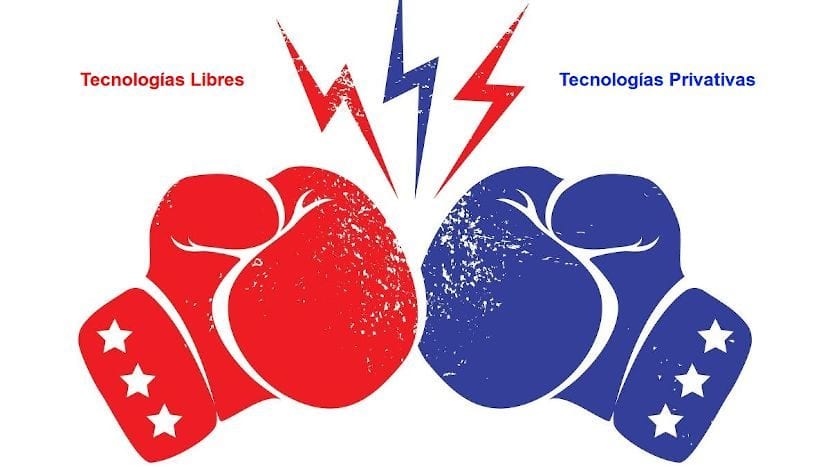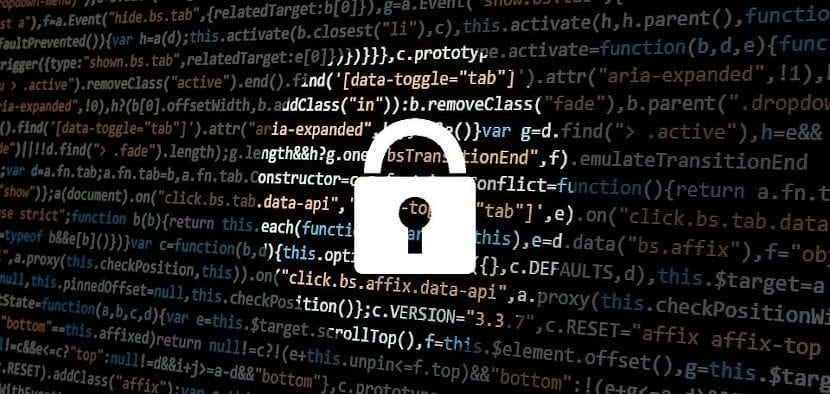
Free and proprietary technologies from the perspective of Information Security
The existing dilemma between privileging the use of «Tecnologías Libres» or «Tecnologías Privativas» has become a legendary fight in our day, since it is a fight that is based on «Seguridad de la Información».
And in this fight both sides of supporters have well-defined and argued strengths. Trying to try that others, their own or outside the dedicated use or not, of «Tecnologías Libres» o «Tecnologías Privativas», opt for one or the other, overcoming their own dilemmas, especially those related to the field of «Seguridad de la Información».

At this point, about choosing What type of Technologies (Free or Privative) should we privilege in our daily lives, both personally and in the workplace or professional, the issue of the transculturation of the values imposed by the large commercial firms in the technology sector, the «Hardware» and the «Software».
Commercial firms, which have mainly supported the sector of «Tecnologías Privativas», giving undoubted predominance to them over the «Tecnologías Libres». But Should we privilege «Tecnologías Privativas» the «Tecnologías Libres»?
However, most users when choosing and / or using any technology, do not really stop to examine the conceptual differences between the two, and less those that have to do with the field of «Seguridad de la Información». What deprives is the functional, if it works or not, for the function in which it wants to be used. Which is not necessarily bad, but important.
And regarding this very important topic, there is abundant literature about it online, but an excellent source to consult is the article by Venezuelan criminologist and computer expert Óscar González Díaz, which we recommend reading later.

What are Free Technologies and Privative Technologies?
There is a lot of literature about it, on this subject of Free Software, in y fuera from our blog. But, about Technologies in general, there is little that is sometimes discussed in our environment. So in summary we can say that:
Private Software
It is the Software that "Has an owner" and for which "It has to be paid", just like how you pay for hardware. And therefore, it has user licenses with explicit restrictions and limitations.
Free Software
It is the software that "Respect freedom" of users and the community. Broadly speaking, it means that users have the freedom to run, copy, distribute, study, modify, and improve the software. That is, free software "It is a question of freedom, not price".
Privative Technologies
Are those "Protected or closed to third parties" through use and marketing licenses and patent rights. Your users get good results in exchange for "Trust blindly" in the ethical operation of the same by the manufacturer.
Free Technologies
They are those that have "Open standards" that guarantee the "Access to all source code". And it brings together the set of technical and scientific knowledge that allows the development of goods and services that satisfy human needs and facilitate their balanced adaptation to the environment. These arise as an extension of the concept and philosophy of free software applied to technologies, that is, respect for the freedom of the user or consumer of the same.
Last but not least, it is good to highlight something about a concept that is often not well defined, which is:
Free Knowledge
And that can be defined as:
It's that one knowledge that can be learned, interpreted, applied, taught and shared freely and without restrictions, and can be used to solve problems or as a starting point for the generation of new knowledge.

Differences
Defenders of «Tecnologías Privativas» argue about «Seguridad de la Información» which a proprietary or closed system is safer if no one has access to its "insides", that is, its source code, design, information, among other vital or important elements.
In counterpart are the «Tecnologías Libres», which proclaim a paradigm diametrically opposed to that of the «Tecnologías Privativas». Well-established paradigm through benefits, such as: Not depending on a single technology provider, and being able to carry out more transparent and collaborative audits and tests on it, using third parties, especially outside those responsible for it, thus facilitating the adaptation, maintenance and integration processes.

Conclusion
Since the conception of the «Seguridad de la Información» is based on a development model based on the cooperation of its users, and the transparency of the processes related to the cooperation activities of each of those involved in a specific process or activity, it can be clearly concluded that the benefits of the «Tecnologías Libres» the «Tecnologías Privativas» they are very concrete.
And in this area especially, of the «Seguridad de la Información», the «Tecnologías Privativas» already have a long history of privacy violations, use of monopolies and commercial or government espionage.
Not counting, the negative experiences of the misuse of the personal data of the users, which leaves them in unfavorable conditions with respect to the owners of the proprietary technology. While working models under the «Tecnologías Libres»Being essentially collaborative and open, they are not prone to the manipulations mentioned above.
And finally, It is important to highlight, since it cannot be denied that when talking about how the penetration of the «Software Libre» in the technological world, we realize that at the level of Servers, Data Centers and Scientific Supercomputing Centers, since Linux («Software Libre») He is the king. And that at the user level, the overcrowding is growing and is on the right track, despite the little public awareness in this regard.
If you want to know a little more about this topicWe invite you to read our related past articles, which you can find at each link below: First article, Second article y Third article.
That debate no longer exists between PROFESSIONALS, 100% of supercomputers, and more than 99% of servers of large companies use Lignux and PLiCA (Free and Open Source Programs - FOSS -).
In domestic and small business computing - SOHO - there is no debate either - the PLiCA would win it - simply the misinformation of consumers makes them consume unsafe systems and programs, precisely because they are proprietary, preferably because they are the ones they know from advertising that PLiCAs don't have.
There is no equidistant debate, simply a large knowledge gap between professionals - and self-trained amateurs - and untrained users that makes there are two totally separate markets in computing, which already existed in the days of the recently deceased UNIX, and were explainable for reasons price, but with the almost free Lignux is only explained by the lack of training of decision-makers.
Greetings, Miguel. Thank you also for your comment. And how it was very good, I made a small observation (correction) about it, about the article, including your point of view.
"But with Lignux being almost free, it is only explained by the lack of training of decision-makers", well, both that possibility and the existence of the network effect in the formats (for example, since everyone uses MS Office, it is difficult to use LibreOffice due to You cannot work together without loading the document, if the majority of the group uses one, the minority has to adapt, or else you have to use what the boss says).
But it is also true that there are other important factors: 1.- The imposition of buying Windows installed in the new laptops of almost all stores, 2.- The lack of attention to GNU / Linux on the part of proprietary programs companies: from games like Fortnite to programs from various companies such as the photo album creator Hoffman until recently, in this sense the cloud plays in our favor by moving everything to the web. But some are missing like AutoCAD, Photoshop, PowerBI, etc. so important in what sectors where individuals may need to work.
Several applications also lack an intuitive ease of use in the installation, configuration and use, and the "nice" finish of some functions: for example the automatic formats of MS Office versus LibreOffice, Access reports versus the LibreOffice Base unfinished, etc.
Due to lack of financing, among other things due to the difficulty of monetizing the work of a software that is free to copy (even if the first copy is sold), since proprietary companies are faster in many developments, such as the advance that MS made. to Ubuntu with the creation of a system for all devices.
Very logical and successful arguments! For Linux on the Desktop to succeed it must remain free and secure, but profitable for businesses and developers, for a good boost with good funding. Although the second tends to kill the first.
Greetings.
This article cites one of my authorship, you can cite me as a source.
Greetings, Oscar. Sure, I've already included your request on the matter. Thank you for your comment and observation.
I have seen that you did not put the first surname (González) and a tilde would be missing in Óscar although it seems that Óscar himself omits it in his name.
Greetings, Oscar! I already made the correction to your name, in the paragraph where I mention you.